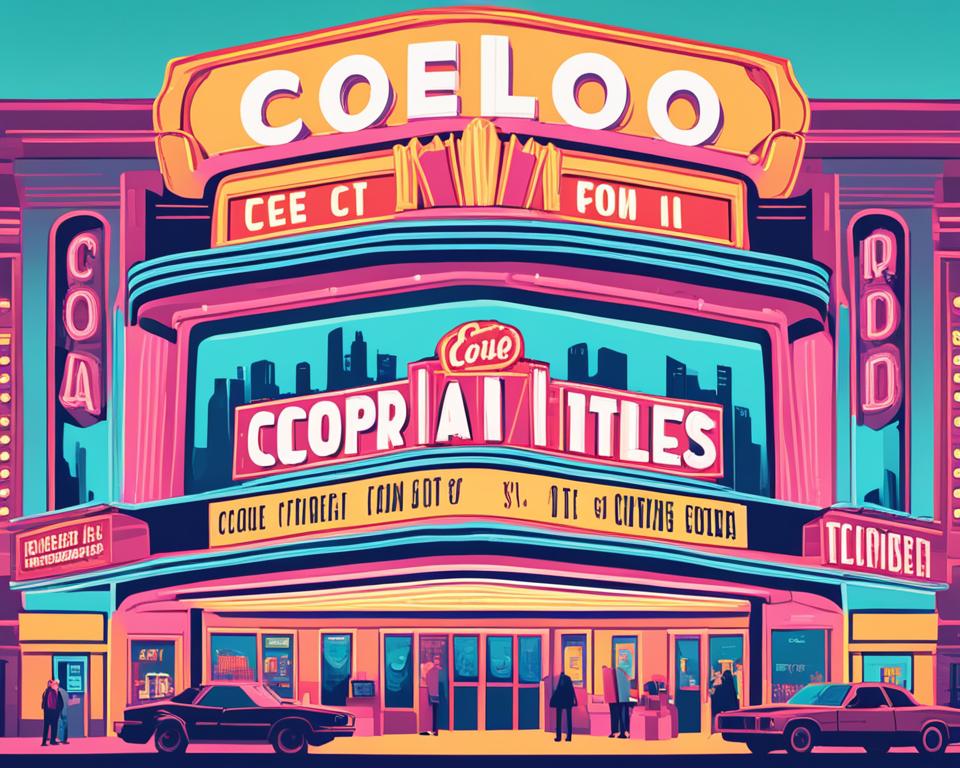The 1990s brought a unique vibe and memorable moments to cinema. From indie-cinema breakouts to blockbuster hits, the decade was a fertile period for filmmakers and film lovers. It laid the foundation for the past few decades, with the rise of documentaries, meta touches in storytelling, and the recognition of independent auteurs. Sundance became a hub for independent filmmakers, while cult classics like “Fight Club” and “Pulp Fiction” made their mark.
Key Takeaways:
- The 1990s was a significant decade for cinema, with a wide range of films capturing the spirit of the era.
- Indie films and blockbusters alike defined the 1990s cinema landscape.
- Documentaries gained prominence, and independent filmmakers found recognition.
- Cult classics like “Fight Club” and “Pulp Fiction” left a lasting cultural impact.
- The Sundance Film Festival became a platform for independent filmmaking.
Table of Contents
Romeo + Juliet (1996)
Baz Luhrmann’s Romeo + Juliet (1996) is a visually stunning and modern adaptation of Shakespeare’s tragic love story. Set in a contemporary Verona Beach, the film captures the intensity and passion of the original play while infusing it with a distinct 1990s aesthetic.
Starring Claire Danes as Juliet and Leonardo DiCaprio as Romeo, the film showcases their undeniable chemistry and brings a fresh energy to the characters. Their performances highlight the youthful innocence and reckless abandon of their star-crossed love.
One of the standout features of Romeo + Juliet is its iconic soundtrack, which features a mix of contemporary and classic songs. From Radiohead’s haunting “Talk Show Host” to Des’ree’s soulful “Kissing You,” the soundtrack perfectly complements the film’s emotional depth and adds another layer to the storytelling.
Luhrmann’s inventive direction and creative choices make Romeo + Juliet a visually captivating experience. The film’s vibrant colors, flashy costumes, and kinetic editing capture the heightened emotions and frenetic energy of youth. Luhrmann’s unique vision creates a world that feels both timeless and contemporary.
With its blend of tragedy, romance, and modern elements, Romeo + Juliet (1996) remains a standout among 90s adaptations of classical literature. It is a testament to Luhrmann’s bold artistic vision and the exceptional performances of Danes and DiCaprio that the film continues to resonate with audiences today.
| Director | Cast | Release Date |
|---|---|---|
| Baz Luhrmann | Claire Danes, Leonardo DiCaprio | November 1, 1996 |
Clerks (1994)
“Clerks,” directed by Kevin Smith, is a defining film of the post-Slacker cultural moment. Shot in grainy black and white, this indie gem captures the grungy ennui and banality of service work in the 1990s.
Set in a convenience store and a video store, the film follows the lives of two friends as they navigate the monotony of their jobs. With its foul-mouthed humor and dead-on portrayal of Gen X disillusionment, “Clerks” resonated with audiences and quickly became an influential cult classic.
Smith’s approach to indie filmmaking, raw and unapologetic, exemplifies the spirit of the 90s independent cinema scene. “Clerks” embodies the DIY ethos and showcased the power of small-budget films with a big impact.
The Cultural Impact of “Clerks”
“Clerks” not only defined a generation but also paved the way for other indie filmmakers to tell authentic stories outside the Hollywood mainstream. Its success at the Sundance Film Festival solidified Kevin Smith’s place in the industry and inspired a new wave of filmmakers.
This table highlights the cultural impact of “Clerks” and its influence on indie filmmaking:
| Impact | Description |
|---|---|
| Indie Filmmaking | “Clerks” showcased the potential of low-budget independent films and opened doors for aspiring filmmakers. |
| Authenticity | The film’s raw and realistic portrayal of everyday life resonated with audiences seeking genuine storytelling. |
| Gen X Representation | “Clerks” captured the disillusionment and struggles of the Gen X generation, speaking directly to their experiences. |
| Cult Classic Status | Over the years, “Clerks” has gained a devoted fanbase and remains a beloved film within indie cinema circles. |
Through its unique blend of humor and social commentary, “Clerks” left an indelible mark on the independent filmmaking landscape, solidifying Kevin Smith’s place as a prominent filmmaker and inspiring future generations of storytellers.
The Ice Storm (1997)
Ang Lee’s “The Ice Storm” is a captivating film that delves into the lives of a dysfunctional Connecticut family during Thanksgiving in 1973. With a talented cast led by Kevin Kline and Joan Allen, the movie explores suburban ennui and the profound impact of the sexual revolution on the characters’ lives. As the Watergate era unfolds, the family’s struggles mirror the changing social and cultural landscape of America.
Set against the backdrop of a tranquil yet deceptive suburban neighborhood, “The Ice Storm” skillfully captures the sense of ennui and discontent that permeated the era. The film juxtaposes the appearance of idyllic family life with the underlying tensions and desires that threaten to tear it apart.
Ang Lee’s masterful direction shines through as he delicately navigates the complexities of relationships, desire, and the consequences of unfulfilled longings. The interactions between the characters are filled with pent-up emotions and unspoken desires, creating a palpable tension that lingers throughout the film.
The Ice Storm” not only serves as a poignant exploration of suburban disillusionment and the breakdown of traditional values, but it also offers a thought-provoking commentary on the impact of the sexual revolution during this tumultuous period. The film invites viewers to reflect on the ways in which societal shifts and cultural changes can shape individual lives and relationships.
With its stunning cinematography, nuanced performances, and evocative storytelling, “The Ice Storm” stands as a testament to Ang Lee’s artistry and his ability to capture the complexities of human emotions. The film mournfully reflects on the end of innocence and leaves a lasting impact on anyone who experiences its hauntingly beautiful narrative.
The Virgin Suicides (1999)
Sofia Coppola’s directorial debut, “The Virgin Suicides,” is a tragic memento mori about the Lisbon sisters, a group of Michigan teens in the 1970s who cast a spell on their small town. Based on the novel by Jeffrey Eugenides, the film explores themes of yearning, memory, and the impact of circumstance on its characters. Coppola’s signature style and her ability to capture the essence of isolation make “The Virgin Suicides” a standout film from the 1990s.
Yearning Characters and Imprisonment by Circumstances
In “The Virgin Suicides,” Sofia Coppola delves into the deep yearnings of the characters, especially the Lisbon sisters who are confined and trapped by their circumstances. The melancholic atmosphere created by Coppola highlights their longing for connection, escape, and freedom. Through their collective yearning, the film reflects the universal human experience of longing for something more, something beyond our grasp.
The film shows how the Lisbon sisters are imprisoned not only by the repressive society and strict upbringing but also by their own internal struggles. They live in a world where their desires and dreams are stifled, leading to a sense of isolation and suffocation. Coppola expertly portrays this sense of entrapment, using visual symbolism and evocative storytelling to capture the characters’ emotional imprisonment.
While the film addresses the specific circumstances of the Lisbon sisters, it resonates on a broader level, reminding viewers of the ways in which we can all feel trapped by circumstances beyond our control. Through her sensitive portrayal of yearning characters and their imprisonment, Coppola crafts a poignant and thought-provoking exploration of the human condition.
A Table Comparing “The Virgin Suicides” to Other Films of the 1990s
| Film | Director | Main Themes |
|---|---|---|
| The Virgin Suicides (1999) | Sofia Coppola | Yearning characters, imprisonment by circumstances |
| Romeo + Juliet (1996) | Baz Luhrmann | Forbidden love, tragedy, youthful rebellion |
| Clerks (1994) | Kevin Smith | Indie filmmaking, Gen X disillusionment |
| The Ice Storm (1997) | Ang Lee | Suburban ennui, sexual revolution |
| Orlando (1992) | Sally Potter | Gender transformation, exploration of masculinity and femininity |
Orlando (1992)
“Orlando,” based on Virginia Woolf’s novel, tells the story of a nobleman who transforms into a woman halfway through his long life. Tilda Swinton delivers a career-making performance as the androgynous Orlando, whose romantic spirit propels them through centuries. Director Sally Potter explores themes of masculinity, femininity, and the passage of time in this visually stunning and thought-provoking film.
Swinton’s portrayal of Orlando in this gender-transformative role is nothing short of remarkable. Her ability to embody both masculine and feminine qualities with authenticity and grace makes her performance a standout in cinematic history. The film’s meditation on masculinity and femininity challenges traditional gender norms and invites viewers to question the fluidity of identity.
Sally Potter’s direction elevates the story to new heights, capturing the essence of Virginia Woolf’s novel in a visually stunning manner. The film’s cinematography, costumes, and set design transport the audience through various time periods, creating a captivating journey of self-discovery and transformation.
Through Orlando’s extraordinary journey, the film explores the complexities of gender and the ways in which societal expectations shape our identities. It serves as a powerful reminder of the fluid nature of gender and the importance of embracing individuality.
Overall, “Orlando” is a timeless masterpiece that continues to resonate with audiences today. Its exploration of gender transformation and meditation on masculinity and femininity challenges preconceived notions and invites viewers to contemplate the fluidity of identity. Tilda Swinton’s breathtaking performance and Sally Potter’s visionary direction make this film an unforgettable cinematic experience.
Conclusion
The films of the 1990s captured the essence of the decade, offering a diverse range of cinematic experiences that still resonate with audiences today. From captivating Shakespearean adaptations to groundbreaking indie films, these iconic movies reflected the unique vibe and cultural milieu of the era.
One of the defining aspects of 1990s cinema was its ability to create timeless soundtracks that became as memorable as the films themselves. The era also witnessed an exploration of Gen X disillusionment, with films like “Clerks” and “Fight Club” delving into the banality of service work and the complexities of contemporary life.
Additionally, the 1990s brought profound meditations on gender, identity, and societal norms. Films like “Orlando” examined the fluidity of gender and the passage of time, while “The Virgin Suicides” explored the impact of circumstance on the lives of its characters. These thought-provoking narratives continue to be celebrated for their cultural impact and their ability to challenge conventional norms.
In conclusion, the films of the 1990s have left an indelible mark on cinematic history. Their enduring relevance, unique storytelling techniques, and exploration of sociocultural themes make them must-watch classics for both cinephiles and casual viewers alike.


